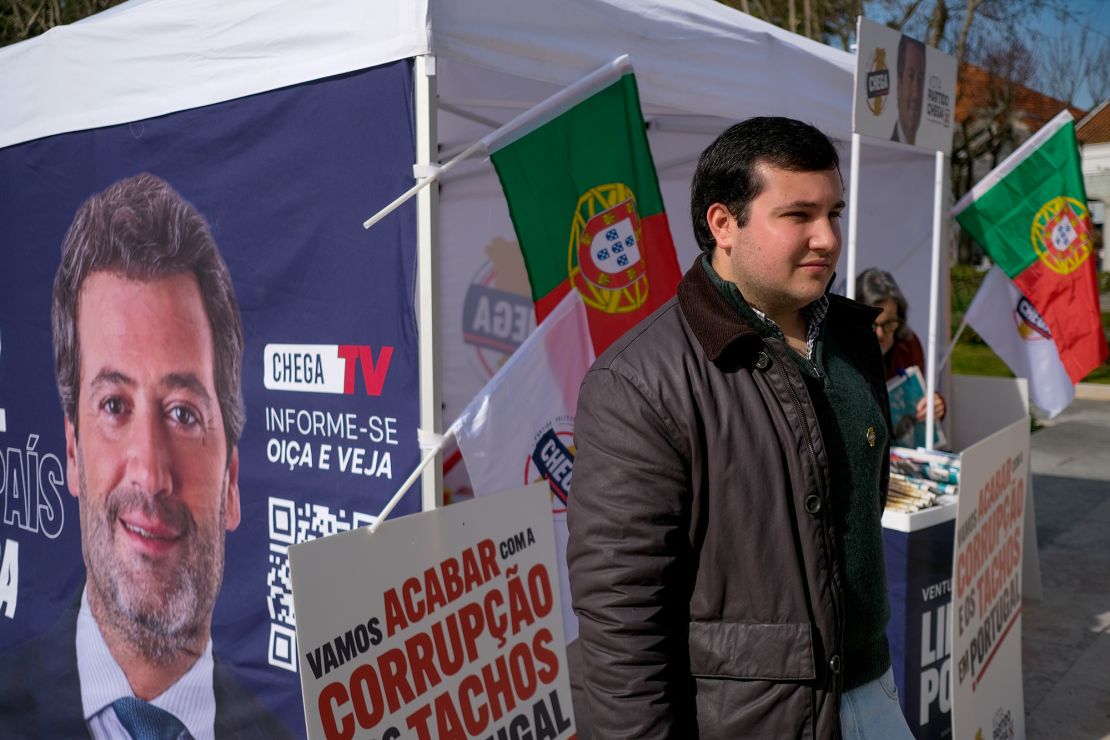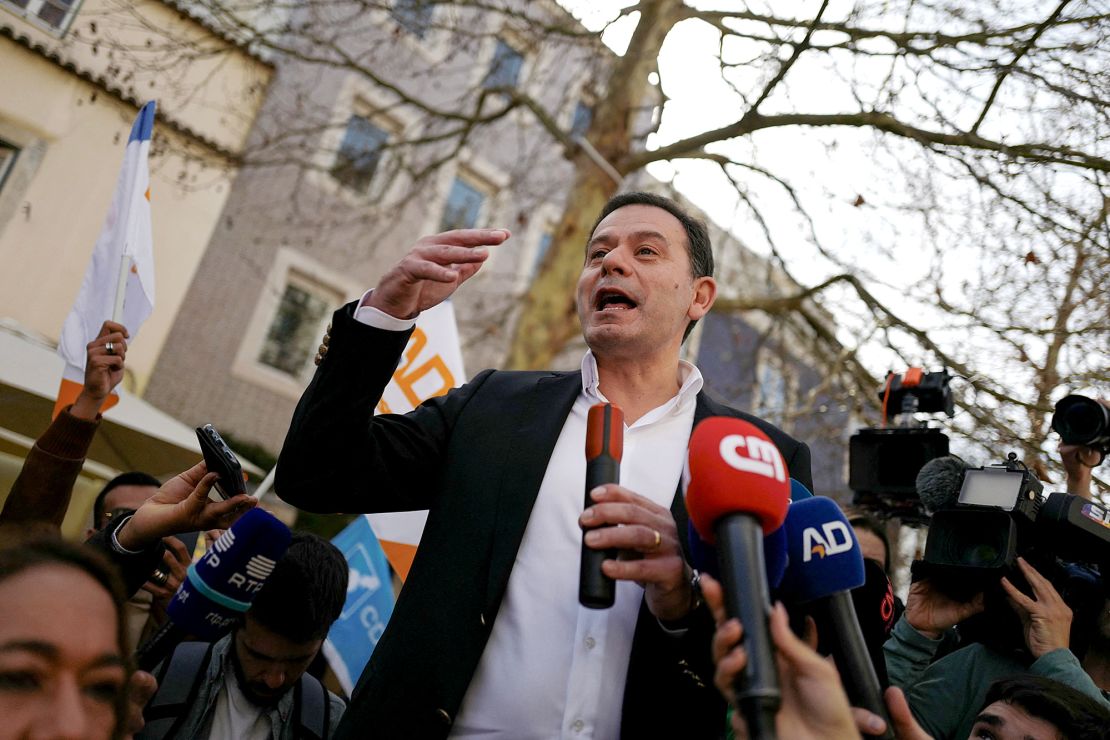Afonso Mestre proudly displays?the?Portugal-shaped?pin badge for the?Chega party?on his green knit sweater, as he greets people on a sunny and crisp morning in Cartaxo, an hour’s drive from?the capital,?Lisbon.
The 20-year-old?took time off?his bachelor’s degree to be here, campaigning for the man?who?he believes will change Portugal.
“I don’t believe in parties, I believe in people,” Mestre says. “Before Chega, I already identified with André.”
By?André,?Mestre means?André Ventura, the?populist?former football pundit?at the helm of Portugal’s radical right-wing party, Chega. Chega translates to “Enough,” and it has been the country’s third-most popular political force,?since winning more than 7% of votes in the last elections, in 2022.
Portugal is one of dozens of countries that are holding elections this year, making 2024 a pivotal year in international affairs. There are signs that a lurch to the right is brewing in many European nations, just as Donald Trump leaps toward the Republican nomination in the US election in November.
Founded in 2019, polls suggest that?the fledgling?Chega?party?may get 15%?in?Sunday’s snap?general?elections,?called after a corruption scandal that implicated members of the country’s ruling party forced the prime minister to resign.
Chega is polling third,?behind what are, historically, Portugal’s two main parties — the center-right Social Democratic Party (PSD), which is running as part of a right-wing coalition named Democratic Alliance (AD), and the incumbent center-left Socialist Party (PS).
“I think we’re on a great path,” Mestre says.

While 15% won’t be enough to rule Portugal, it may be enough to split the vote and shake things up, and put Chega in the powerful position of kingmaker.
If the?right-wing?AD?coalition?is unable to form a government on its own, or with the remaining center or right-wing parties, it may be forced to enter talks with Chega.
AD leader, Luis Montenegro, has been campaigning on a platform for change, following eight years of government by the?center-left.?His?version, he says,?is “positive,” “safe” and “stable”?and?contrasts?with?other options, chief among them Chega.
He has sought to present his coalition as the?right’s?credible choice and has said he has no intention of aligning himself with the radical right.
However, others in his party have refused to rule out the idea?of bringing Chega into the fold. The ambiguity has kept the PS and its leader, Pedro Nuno Santos, in the race.
The incumbents have used the potential threat of what they say is the?far-right?coming into power to sway voters?their way.
Emulating Trump’s ‘drain the swamp’
Ventura’s brand of populism is not exactly new,?but it was a sort that Portugal seemed immune to.
While populists like Marine Le Pen in France or Matteo Salvini in Italy made huge gains nearly a decade ago, in Portugal, that surge didn’t happen straight away.?Now the right-wing populism is having its moment.
“I am a radical against corruption,” Ventura said, shouting, angrily, in a pre-recorded radio campaign ad. “I’m a radical against cronyism.
Ventura’s? promise?that he can clean up Portuguese politics of corruption is reminiscent of Trump and his vow to “drain the swamp” in the US political elite.
And a?series of corruption scandals involving several politicians from the two main parties is what has helped Chega gain its foothold.
And it’s an issue that resonates.?A recent EU study found 93% of people in Portugal believe corruption to be widespread, the third-highest in Europe, behind only Greece and Croatia.
University of Lisbon political scientist Pedro Magalh?es, says?Ventura’s?narrative?has flourished in the Portuguese political environment.
“This perception [on corruption] has been prevalent for quite some time, so the demand was there — what wasn’t there was the supply,” Magalh?es said.?“Chega has filled that gap.”
Very much like other radical parties across Europe, Ventura’s Chega has also?attacked?the idea of?gender equality,?and played on voters’ fears on issues of security, crime and immigration.
The party has flirted with extremism and has been accused racism.?Ventura himself has been tried and convicted for?making offensive, racist remarks in reference to a Black family from one of Portugal’s poorest neighborhoods, a conviction ?that the Supreme Court upheld. The party has denied accusations of racism, but some members, and many of its supporters, openly flaunt hateful narratives on social media.
Ventura also once wrote on social media that a fellow MP, who holds dual Portuguese-Guinean citizenship, should “return to your own country.”
But as with like-minded movements,?Chega ?seems to have brushed the criticism aside and has continued to grow.
“They fight on a different axis,” Magalh?es explained, saying the anti-system message remains at the core.?“[Ventura’s]?discourse is one that frequently places the people, against a political class seen as immoral and corrupt.”
Young, conservative and proud
Back in Cartaxo, Mestre smiles as he hands out fliers, talking up his party.
The town sits on the boundary between the districts of Lisbon and Santarem – between the cosmopolitan and trendy capital, and the gateway into Portugal’s often forgotten rural heartland.
This is a prime hunting ground for Chega and they’re hoping to elect three of the electoral district’s nine members of parliament.?Mestre knows this. He is young but says politics has been a calling for some time.
“When other kids were watching cartoons, I was paying attention to politicians,” he says.
He always leaned towards the right-wing parties, but there was no party that fully convinced him. His parents asked him to wait until he turned 18 before he joined any of them and, by then, Ventura and Chega had reeled him in.
“I joined Chega on December 5, 2021, one day after my 18th?birthday,” he says. “It was best decision I could’ve made.”

Mestre is not the kind of voter Chega usually appeals to. Magalh?es says populist parties usually attract conservative men, with some education but,?they’re usually much older than Mestre.
But “all new parties tend to attract younger people,” he adds. And Chega has been able to capitalize?on that, relying on a savvy communication strategy and wide-ranging presence on most social media platforms.?A?study by the University of Beira Interior?found that?in Portugal, parties have a combined 2.1 million followers on social media. Chega alone has 590,000 unique followers, nearly 30% of the total.
On YouTube alone, Chega has 155,000 followers, more than all other parties combined. It also leads on TikTok, with 32,000 users following the party’s account. Ventura’s own account has nearly 222,000?followers, more than any other candidate.
Cátia Moreira de Carvalho, a senior researcher with a focus on psychology and extremism at Leiden University and the University of Porto, believes Chega’s social media presence, along with their “simple, attractive language,” is a cocktail that can be hard for young people to resist.
“These narratives have an impact with young people because they also have a need to affirm themselves, a need to find themselves, to understand what their place in the world,” Moreira de Carvalho says.
And one topic in particular is resonating —?gender equality. There’s too much of it, according to some young Portuguese men.
“Chega presents itself as a party that supports that regression, that nostalgia for those more traditional norms and gender roles,” Moreira de Carvalho adds.
And after eight years of?Socialist rule, Portugal seems primed for change. But a win on the right may come at the cost of allowing Chega into government.
Both Magalh?es and Moreira de Carvalho say that could open a dangerous precedent and help normalize some of the radical narrative Ventura has employed, and which many say is extreme.
But some young people like Mestre don’t see it that way.
“We are not extremist, we simply want the good of the country,” he says. “We are the future, the future will go through the Chega party.”


